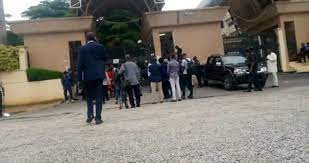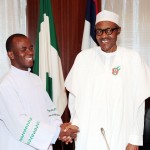Heavy Security Presence As FG Bars Journalists From Nnamdi Kanu’s Trial
Featured, Latest Headlines, News Across Nigeria Monday, July 26th, 2021
(AFRICAN EXAMINER) – There is tight security at the premises of the Federal High Court Abuja leading up to the trial of Nnamdi Kanu.
Journalists at the entrance to the court are barred by officers of the Department of State Service from entering the court on the ground that they were not accredited to cover the trial.
African Examiner had reported that the Department of State Services barred some media organisations from covering the trial of the leader of the Indigenous People of Biafra, Nnamdi Kanu, as his trial continues today.
Barred along with The PUNCH are The Guardian, Vanguard, Daily Trust, Tribune, Daily Sun, The Cable, and Daily Times, among others.
The media organisations the DSS accredited are Daily Post, ThisDay, Premium Times, The Nation, Daily Independent, The Herald, National Television Authority, Television Continental, African Independent Television and Channels Television.
The DSS did not give reasons for picking 10 media houses while barring others from covering the trial.
A call to the DSS spokesman, Dr. Peter Afunnaya, rang out, while a text message sent to him on the action of the secret police had yet to be responded to as of the time of writing this report.
However, a Senior Advocate of Nigeria, Mike Ozekhome, who condemned the decision to prevent The PUNCH and other media organisations from covering the trial, said the position of the law was that every trial should be carried out in public and everyone entitled to watch the proceedings.
He said, “Our legal system does not admit of secret trials. We are not a country of witches and wizards operating in a coven.
“For a trial to be free and fair, Section 36 of the Constitution says it must be carried out openly and publicly. Banning some media houses from covering Nnamdi Kanu’s trial is not only a sin against Section 36 of the Constitution, it also violently offends the provision of Section 22 of the same Constitution which gives the media the right and responsibility to ensure that the provisions of Chapter Two of the constitution dealing with the fundamental objectives and directive principles of state policy are upheld and that the government is held accountable to the people of Nigeria.”
Speaking in similar vein, Remi Olatubora (SAN) said preventing media organisations from performing their constitutional duty runs contrary to the right to freedom of expression as guaranteed under Chapter Four of the Nigerian Constitution.
Olatubora said, “It is a signal that we are now under a full dictatorship. One serious angle to the barring of a section of the media is whether the trial can still, in those circumstances, be regarded as trial in the public or a free and fair trial as required by the Constitution.”
Also, Boma Alabi (SAN) said, “Generally speaking, the courtroom is a public space, everyone can come in.
“If it is a contentious trial that people can come in and disrupt proceedings, then the court will make arrangements to ensure that the proceedings are not disrupted. It is within the court’s right to do so.”
Related Posts
Short URL: https://www.africanexaminer.com/?p=65845




















